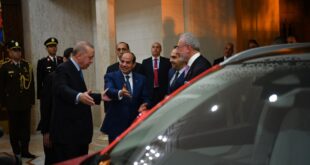Muhamad Yehia
UNITED NATIONS (AP) — The topics of Israel’s war with Hamas and fighting in Lebanon have dominated speeches at the U.N. General Assembly’s meeting this week. On Thursday, one side finally got the podium — including a moment of drama amid the ocean of words from the world’s leaders.
The first words from MAHMOUD ABBAS, head of the Palestinian Authority, were a single sentence repeated three times: “We will not leave. We will not leave. We will not leave.” Abbas used the rostrum of the U.N. General Assembly as he typically does — to criticize Israel. But this was the first time he did so since the Oct. 7, 2023, attacks by Hamas on Israel that triggered an Israeli military operation that has devastated the Gaza Strip.
He accused Israel of destroying Gaza and making it unlivable. And he said that his government should govern post-war Gaza as part of an independent Palestinian state, a vision that Israel’s hardline government rejects.
Israel has maintained its military operations are justified and are necessary to defend itself. DANNY DANON, Israel’s U.N. ambassador, responded to Abbas’ speech within minutes with a critical assessment. “Abbas spoke for 26 minutes and did not say the word ‘Hamas’ once. Since the massacre of Oct. 7, Abbas has failed to condemn Hamas for their crimes against humanity,” he said. “Only when he stands on the U.N. platform does he talk about a peaceful solution,
Leader of Palestinian Authority denounces Israeli Gaza offensive at UN, insists: ‘We will not leave’
UN General Assembly widely supports a Palestinian resolution demanding Israel end its occupation
UN considers resolution demanding Israel end its occupation of Palestinian territories
Speaking later Thursday, Lebanon’s foreign minister called for an immediate cease-fire “on all fronts.” ABDALLAH BOUHABIB called Israel’s actions “acts that are tantamount to war crimes” and warned that continued violence at his nation’s border will “transform into a black hole that will engulf international and regional peace and security.”Israeli Prime Minister BENJAMIN NETANYAHU is scheduled to address the General Assembly on Friday morning and arrived in New York on Thursday.
Here’s your daily guide to what’s going on at the United Nations this week
The president of Haiti’s transitional presidential council, Edgard Leblanc Fils, addresses the 79th session of the United Nations General Assembly,.
The president of Haiti’s transitional presidential council says he supports a U.N. peacekeeping mission to fight gang violence still overwhelming authorities. It’s the first public support announced by a Haitian government official since the U.S. proposed a U.N. peacekeeping mission earlier this month as one way to secure more resources for a U.N.-backed mission led by Kenya that officials say lacks personnel and funding. EDGARD LEBLANC FILS said he’s convinced that a change of status would guarantee the full success of the current mission.President of Kenya William Samoei Ruto, addresses the 79th session of the United Nations General Assembly, .
Kenyan President WILLIAM RUTO said his country is committed to international peace citing participation in regional and U.N peacekeeping missions. Ruto said 382 Kenyan officers had been deployed to Haiti and said the support had advanced Haiti’s security, He and thanked member states that have supported the mission, and said insufficient equipment and logistics had hindered further deployment by other nations.
TINY THINGS, OUTSIZED IMPACT: World leaders endorsed a call for action against the threat of antimicrobial resistance. Antimicrobial resistance is the term officials use for when bacteria, viruses, parasites, and fungi develop the ability to shrug off medicines that previously had controlled them. Eight years ago, the U.N. General Assembly adopted a declaration in which countries pledged to track cases and develop action plans. On Thursday, the U.N. held another high-level meeting and adopted another declaration. This one calls for, among other things, sustainable national funding for antimicrobial resistance work and for an independent international panel focused on evidence-based measures to fight the problem. It also set a goal of reducing superbug-associated deaths by 10% by 2030.
RESPECTING ELECTION RESULTS: The United States and Argentina are leading calls for countries around the world to step up pressure on Venezuelan President NICOLAS MADURO to respect the result of July’s elections and cede power. Secretary of State ANTONY BLINKEN and Argentine Foreign Minister DIANA MONDINO co-hosted an event on the sidelines of the U.N. General Assembly to urge others to boost their efforts to isolate Maduro ahead of a Jan. 10 inauguration ceremony, at which he will be sworn in for another term despite losing the election to the opposition, according to most analysts and observers.U.S. Secretary of State Antony Blinken speaks during the High-Level Meeting on Addressing the Existential Threats Posed by Sea-Level Rise at the United Nations Head quarters
GRIDLOCK: The General Assembly always brings a suite of police barricades to streets around the U.N. But the headquarters and some other parts of midtown Manhattan were ensconced in a shifting set of blocked streets and sidewalks Thursday evening because of protests related to Netanyahu’s arrival in New York ahead of his assembly speech.Palestinian supporters march near the United Nations headquarters at a protest against Israeli Prime Minister Benjamin Netanyahu during the 79th session of the UN General Assembly, A trio of leaders of international climate negotiations urged colleagues to step up efforts to fight global warming, but outside groups and endangered nations told those leaders to look in the mirror, take their own advice and stop pumping out fossil fuels. At the United Nations, the troika of the current and next two presidents of U.N. climate conferences told other leaders to make their required climate-fighting targets — due next February — much more ambitious. New national plans should be aligned with the 2015 Paris Agreement goal of limiting warming to 1.5 degrees Celsius (2.7 degrees Fahrenheit) since pre-industrial times, urged the trio of leaders from the United Arab Emirates, Azerbaijan and Brazil.
Longtime climate negotiation analysts ALDEN MEYER of the think tank E3G and BILL HARE, CEO of Climate Analytics, which tracks emissions pledges, said the negotiation chiefs from the UAE, Azerbaijan and Brazil were big on soaring rhetoric, but their own nations’ actions fell far short.
 موقع وجه أفريقيا موقع وجه أفريقيا هو موقع مهتم بمتابعة التطورات في القارة الأفريقية
موقع وجه أفريقيا موقع وجه أفريقيا هو موقع مهتم بمتابعة التطورات في القارة الأفريقية



